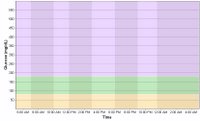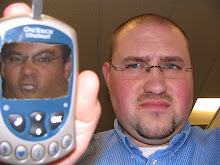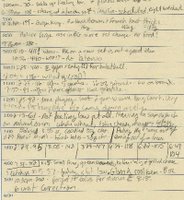While I agree that the whole 15/15 rule makes perfect logical sense, but I would like to sit down and have a heart to heart talk with whomever "invented" this concept.
The 15/15 rule is this: When experiencing a low blood sugar (aka reaction, insulin shock or hypoglycemia) you are to eat 15 grams of fast acting carbohydrates, wait 15 minutes, then test your blood sugar again to see if you need additional carbohydrates.
This is all fine. IN A ROBOT!!!!!!!
Anyone who has experienced a low blood sugar can fully appreciate the unyielding urge to eat
anything and
everything you can get your hands on!! You want to eat. And you want to keep eating until you actually
feel better.
Unfortunately, this is usually about 10 minutes of continued eating that is above and beyond what is actually required to bring your blood sugar back to a normal range.
It takes surprisingly few grams of carbohydrates to actually bring your blood sugar back up into a normal range. This depends a lot on whether you have additional insulin still working to lower your blood sugar, or if you are done dropping.
In this post I'm talking about a low where I was pretty much done dropping.
I am fortunate to still have many, if not all, symptoms of lows. There are other folks who have what is called "hypoglycemic unawareness". That basically means that they do not experience any symptoms of low blood sugars. This is a particularly dangerous condition, because if a low is not treated promptly you run the risk of becoming incoherent or even losing consciousness. Scary. My friend
Wil talks about some of his experiences and his decision to use the Guardian RT continuous glucose sensor to help him deal with this over at his
blog.
I had a low tonight from which I learned something interesting (at least to me). I came back from a walk and sat down feeling very shaky, ravenously hungry and very "jittery". I checked my blood sugar and it was 51.
It had been some time since I had eaten, so I justified some snacks out of the vending machine at work. I got a bag of peanut M&M's and a bag of "Zoo Animals" animal crackers. The M&M's had around 30 grams of carbs and the animal crackers had 50. That's a grand total of 80 grams of carbs. I did remember to open the bags before spasmatically cramming every morsel into my mouth. I didn't even notice the wrappers.
When I was done eating, I still felt low! Well, of course, it does take
a little time for that stuff to hit the bloodstream.
The problem is that the
instinctive urges to eat are often times much more powerful than your rational thought process. Keep in mind that your brain runs off
glucose, of which you are presently running low. See the problem?
Somehow I kept my wits about me and didn't eat anymore.
My first test of 51 was at 5:08. As of 5:25, which is just a little more than 15 minutes later I was up to 124. The thing is, I was
still feeling low! When you experience a low blood sugar, one of the things your body does is to dump a nice big dose of adrenaline. See, if you don't get some sugar, your body is afraid you will expire. So it responds with the good old fight or flight response.
While my ravenous hunger had gone away, I still felt very shaky and extremly jittery. I could not focus on anything and basically felt like getting up from my desk and pacing around like some deranged lunatic (or a low blood sugared diabetic).
Another few minutes and I was over that. The next thing that hit me was an overpowering wave of sleepyness. I felt drained.
Some lows feel much worse than others, and I'm not sure why. I have tested lower yet didn't have symptoms as strong or noticeable as higher tests.
I see a continuous glucose sensor very valuable in learning how many carb grams it takes to treat a low, and how long it takes for different items to bring the BG back to normal, AND tracking how long the symptoms last even after the blood sugar has returned to a normal range.
You will all appreciate that an hour later I was at 227 because I totally forgot to bolus for the additional grams I ate when treating that low. Typical. Did I mention the brain is low on glucose during a reaction?
 This is a typical graph for blood sugar readings. That tiny green strip is considered the "target" range. That narrow strip goes from approximately 80 - 180. You can see, just looking at the picture, it's a tight area!
This is a typical graph for blood sugar readings. That tiny green strip is considered the "target" range. That narrow strip goes from approximately 80 - 180. You can see, just looking at the picture, it's a tight area!




 This is a portion of the insert that comes along with each vial of Humalog insulin. It is a graph depicting the blood insulin levels after injection of both Humalog (dashed line) and Regular (solid line).
This is a portion of the insert that comes along with each vial of Humalog insulin. It is a graph depicting the blood insulin levels after injection of both Humalog (dashed line) and Regular (solid line).